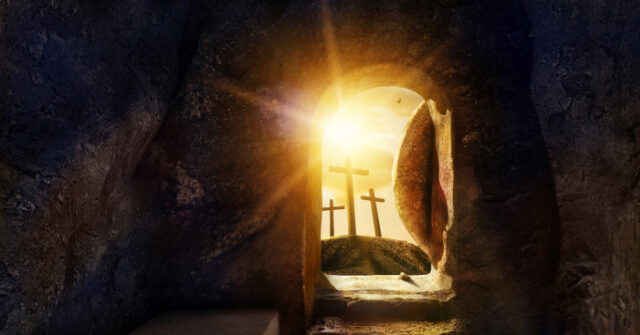The exclamation “He is risen” is thrown around so much during the Easter holiday. But what does it mean? Why is the grisly image of the cross of Calvary so revered by Christians?
Most are aware of the story of Jesus being crucified on Good Friday and emerging from his tomb after three days. But Christians believe the meaning of his resurrection is much more significant than merely showcasing divine power over death.
The Gospels tell us two followers of Jesus went to his tomb early the morning of the Sabbath. As Luke 24:2-8 reads:
They found the stone rolled away from the tomb, but when they entered, they did not find the body of the Lord Jesus. While they were wondering about this, suddenly two men in clothes that gleamed like lightning stood beside them. In their fright the women bowed down with their faces to the ground, but the men said to them, “Why do you look for the living among the dead? He is not here; he has risen! Remember how he told you, while he was still with you in Galilee: ‘The Son of Man must be delivered over to the hands of sinners, be crucified and on the third day be raised again.’ ” Then they remembered his words.
Jesus had in fact predicted his death and resurrection. He hinted at first – as John documents, Jesus said he would rebuild the temple in three days – and later outright foretold his death to his apostles. Mark 8:31-33 reads:
He then began to teach them that the Son of Man must suffer many things and be rejected by the elders, the chief priests and the teachers of the law, and that he must be killed and after three days rise again. He spoke plainly about this, and Peter took him aside and began to rebuke him.
But when Jesus turned and looked at his disciples, he rebuked Peter. “Get behind me, Satan!” he said. “You do not have in mind the concerns of God, but merely human concerns.”
Jesus knew he had to die – and why. Like a dutiful son, he accepted his Father’s wishes.
But being mortal, he knew the pain that awaited him. Luke describes Jesus’s “anguish” about his instructions the night Jesus was apprehended by the Romans in Luke 22:39-44:
Jesus went out as usual to the Mount of Olives, and his disciples followed him. On reaching the place, he said to them, “Pray that you will not fall into temptation.” He withdrew about a stone’s throw beyond them, knelt down and prayed, “Father, if you are willing, take this cup from me; yet not my will, but yours be done.” An angel from heaven appeared to him and strengthened him. And being in anguish, he prayed more earnestly, and his sweat was like drops of blood falling to the ground.
But the Father did not take the cup from the Son, and Jesus submitted willingly to his humiliating, excruciating death by crucifixion.
Just three days later, an angel rolled the stone away, and Jesus emerged – still with the scars from the wounds inflicted upon him.
Death was conquered! It all makes for a great story. But why is it so significant?
It isn’t merely that Jesus arose from death that gives Christians cause to rejoice. We rejoice in his death as well.
“‘He himself bore our sins’ in his body on the cross, so that we might die to sins and live for righteousness; ‘by his wounds you have been healed,’” 1 Peter 2:24 reads, referencing the Old Testament prophecy from Isaiah which foretold Jesus’s coming and mission.
Through his crucifixion, Jesus paid our sin debt. And like Christ, we too can conquer the death that awaits us to be “born again” in Him – if we willingly accept his sacrifice on our account and repent of our rebellion against God.
As the Apostle Paul writes in Romans 6:8-9, “Now if we have died with Christ, we believe that we will also live with him. We know that Christ, being raised from the dead, will never die again; death no longer has dominion over him.”
Nor must death have dominion over us. That’s why the death and resurrection are so meaningful to those who believe. Not only has Jesus risen from the clutches of the grave, but he offers to deliver us from its grip as well, to worship Him eternally in paradise.
So when hearing “He is risen” during Easter, remember it’s more than just a simple catchphrase. It’s an encapsulation of all that Christians believe God offers us – all of us – through his Son.
And that’s a cause for celebration.
Bradley Jaye is Deputy Political Editor for Breitbart News. Follow him on X/Twitter and Instagram @BradleyAJaye
Breitbart News
Read the full article .


